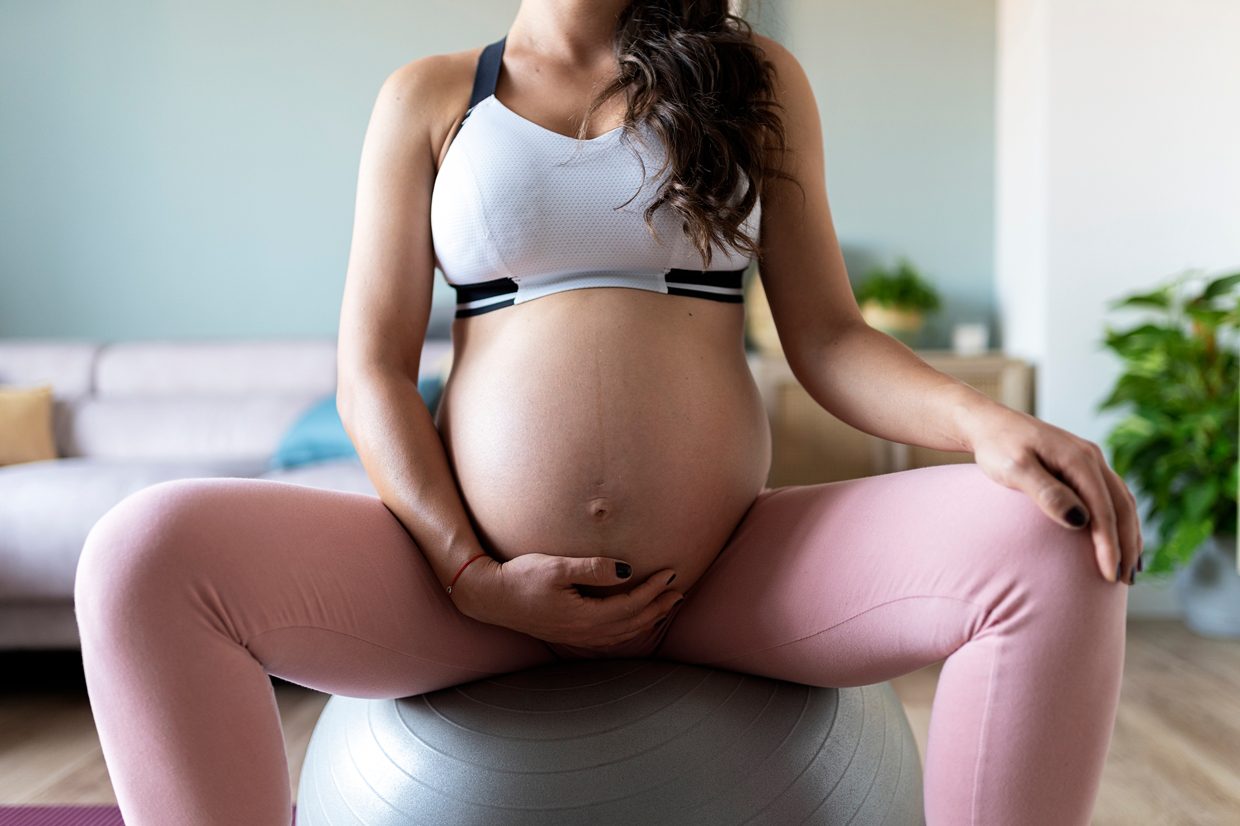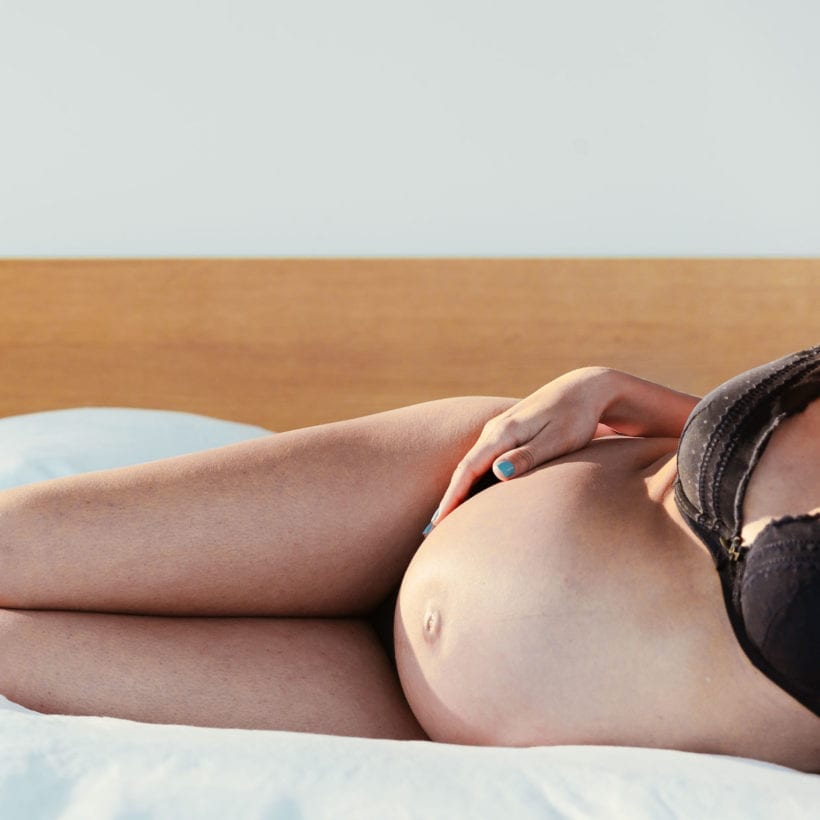As a generally health-conscious person and someone who has spent her career writing about wellness, I thought I would be prepared to have a smooth-sailing pregnancy. And for the most part, it has been a textbook experience. However, no matter how much you think you know until you’re in the thick of growing a human, it’s hard to imagine the process. Before I saw that positive sign on a test, I worked out five days a week, ate a balanced diet, intermittent fasted, and had more energy than I knew to do with. But now, life looks mighty different.
Everything in my body started to feel differently from the first trimester: my breasts grew three times their size, my stomach began bloating, and my emotions were unpredictable. Plus, food aversions made it difficult to eat since nothing felt appealing. Now, as I’m halfway through my second trimester, sleep is becoming more complex, as my active daughter kicks at nighttime, and a bigger belly makes it tough to get in a comfortable position.
However, the biggest lesson during this special (and fascinating!) time in my life is to give myself and my body grace. Wellness might have been essential pre-pregnancy, but it’s even more vital when you’re expecting.

As a mom of two, Pilates and wellness instructor Tara Riley explains, pregnancy causes many changes in the body, including hormone and immune function changes. “Taking good care of yourself during pregnancy can help keep you and your baby healthy and safe,” she says. “Healthy habits can better equip you for labor and delivery and prepare you for the strains put on your body during pregnancy and while looking after your newborn.”
Here, gurus recommend their top prenatal tips for a healthy, happy pregnancy:
Meet the Experts
Tara Riley is a Pilates and wellness instructor.
Lisa Richards MSN, CNM, a midwife for Ovia Health app.
Mandy Major, PCD (DONA), is a certified doula, the founder of Major Care, and a spokesperson for Phillips Avent.
Dr. Jessica Shepard is an OBGYN and the chief medical officer at Verywell Health.
Dr. Kathleen Green, MD, is an OBGYN at the University of Florida and OBGYN provider on Maven Clinic.
Keep your body moving.
Though I was an avid fitness fan before pregnancy, I was so exhausted during the first trimester that I couldn’t work up the motivation to move. Now, I’ve picked exercise back up, and I try my best to walk (instead of running) three times a week and lift (lighter) weights. According to Lisa Richards, MSN, CNM, a midwife for Ovia Health, this is the right approach. As she puts it, you don’t have to be a ‘hit-the-gym-every-day’ type of person, but it can really help to find a low-impact and pregnancy-safe physical activity or exercise that you enjoy doing.
“The more you like it, the more likely you are to stick with it,” she continues. “Exercise in pregnancy can lower risks of complications like gestational diabetes or hypertension, improve mental health and some pesky pregnancy symptoms like swelling or constipation, and possibly ease your birth experience and postpartum recovery.”

Try these:
- Knix BlissFit™ Maternity Legging, $50.00
- Yoga Anytime, $126.00 for a six-month subscription
- Bande Monthly Membership, $40.00 per month
Drink more water.
I’ve lovingly started calling my 36-ounce canteen my ‘emotional-support water bottle’ since I take it everywhere I go. I aim to refill it four times a day, and it’s not a tough goal to meet since I’m thirsty 24/7. According to Riley, this is common during pregnancy since a woman’s blood volume increases by 50 percent to supply essential nutrients to their baby and placenta.
“Drinking water will help support that gain, and it can help reduce some of the common symptoms of pregnancy such as constipation, UTIs, hemorrhoids, fatigue, swelling, and headaches,” she explains.
Try these:
Start your postpartum plan now.
Recently, my husband and I attended our very first labor boot camp. We also hired a doula team for prenatal, postpartum, and birth care. Though we are still 16 weeks away from my due date, doing some prep work for our daughter’s life-changing arrival makes us feel more at ease. Once you reach the halfway mark of your pregnancy, it’s wise to strategize your game plan, says Mandy Major, PCD (DONA), a certified doula, the founder of Major Care, and a spokesperson for Phillips Avent.
“For all the anticipation and joy of your little one arriving, the ‘what ifs’ can really wear on your stress and mental health,” she continues. “Don’t compartmentalize them or push those worries away. Pull together a plan by talking with your partner or support person and answer basic but key questions.”
Some examples include:
- Who is allowed to visit us?
- Do we want to hire a doula?
- Do we want to hire a night nurse?
- What is our plan for parental leave?
- What is our plan for childcare?
- Who will take care of our pets?
- How will we feed ourselves?
Try these:
Try your best to sleep.
Though I could sleep ten hours easily in my first trimester, it becomes harder and harder to catch those Zzz’s as I get bigger and bigger. After 20 weeks, pregnant women are advised to avoid sleeping on their backs or stomachs and instead should try to get cozy on their left sides. The use of pregnancy pillows can help support the bump (and frankly, the boobs), but it’s still a learning process, particularly if like me, you were always a stomach sleeper. Still, sleep is a vital part of pregnancy wellness, Riley reminds.

“Getting seven to nine hours of quality sleep is one of the most important things for your mental and physical health. Once the baby arrives, sleep will be in short order for a while,” she says. “During pregnancy, you’ll probably feel more tired than usual, but it can be difficult to find a comfortable position, especially as the baby grows. Try lying on your side with knees bent and a pillow between knees and under your bump. This position can help take pressure off your back and the large blood vessels there as well as helping prevent or reduce varicose veins and swelling in your legs.”
Try these:
Prioritize nutrition, but don’t obsess about it.
I only gained one pound in my first trimester because I could only tolerate eating very few things, like plain noodles and bagels. This was a significant stretch from my previous diet, which was full of eggs, lean proteins, and vegetables. Though it’s much easier to find foods I like now, I still can’t stand the smell of eggs, and I eagerly crave my cinnamon-raisin bagel each morning. I try my best to eat well, but I also know it’s important to go easy on myself. I steer clear of fast food, but if I want a scoop of dairy-free ice cream in the evening, I have it.
Richards says that it can really help to focus on the big picture rather than the details of each meal when it comes to nutrition. “It’s important to eat veggies, but it can also be okay to give in to a pregnancy craving. If you have a carb-heavy meal without much protein, don’t beat yourself up about it,” she continues. “Generally, if you aim for balance with a variety of whole foods, you’re likely to meet your nutritional needs. The pregnant body needs nutrients as the building blocks for growing a new baby, but your body is smart, and a growing baby is usually good at getting what it needs from you.”
Try these:
- Brodo Bone Broths, 6-pack bundle starts for $77.94
- Freshly Meal Subscription, $8.00/meal
- Ritual Prenatal Vitamins, $35.00
Don’t stop lifting weights.
While weight-lifting is often controversial, more and more doctors are giving it the seal of approval for expecting women. Particularly if you’re someone who lifted weights before you got pregnant, it’s not a bad idea to continue your routine, with some modifications, says Dr. Jessica Shepard, an OBGYN and the chief medical officer at Verywell Health. “The benefits of weight lifting are many and include prevention of lower back pain, strengthening the abdominal and core muscles and also overall feeling stronger,” she continues. “For women who plan to continue with weight lifting in pregnancy, adjustments may need to be made, so consult with a physician before continuing the regimen.”

Try this:
- ToneItUp Membership, $13.00/month
Get a prenatal massage.
One of my biggest splurges during pregnancy has been regular prenatal massages. Typically, massage therapists won’t see you until after your first trimester, but once you reach that coveted 13 weeks, start booking some R&R for you and your baby. As Major says, it’s incredibly helpful to ease the pain of aching joints and provide a moment of calm. “If this is your first child, I always encourage my doula clients to get at least one prenatal massage and one nice dinner before the baby arrives. Those little luxuries are wonderful — and seriously hard to come by once the baby arrives,” she adds.
And if you don’t have the budget to book regular massages, register for them on your baby shower registry. Or, ask your birth partner for a rub-down here and there.
Try these:
- The Care Crate Co Spa Day Gift Box, $54.99
- MassageEnvy Gift Card, any amount
Book an appointment with a pelvic floor specialist — and a dentist.
For those who are expecting and starting to experience pelvic pain, it’s important to take action ASAP, Dr. Shepard urges. A baby grows in your uterus for ten months during pregnancy, which changes many parts of your body, including your pelvic floor. This is a vital part of your body since the pelvis is a cavity that houses all the reproductive organs and is supported by the pelvic floor.
“Pelvic physical therapy can provide the support to learn how to provide optimum strength during and after the pregnancy. When a pelvis is poorly supported, it can lead to bowel, bladder, and sexual dysfunction,” she warns. This is why many women do pelvic floor exercises, like Kegels, throughout pregnancy. If you have concerns, talk with your doctor, midwife, or doula for their recommendations.
Also, dental health is super important during pregnancy too. When you’re expecting, you will see an increase in bacteria within your mouth, and hormones can cause your teeth to be more sensitive or your gums to become inflamed. Yikes! That’s why it’s important to remain diligent and brush for two minutes twice a day, mainly since if you get a cavity, you can’t get an X-ray while expecting and may have to wait until after you give birth to get it filled.

Try these:
Prioritize mental and emotional health.
During pregnancy, Richard says the risks of mental health concerns like depression and anxiety increase. Many women are brushed off when they feel down since others will blame it on ‘pregnancy hormones.’ It is true your hormones shift, but that doesn’t mean your concerns are valid. “Untreated mental health concerns in pregnancy can come with increased pregnancy risks and health risks to the baby,” Richards says. “Some evidence shows that mental health treatment during pregnancy, like therapy, can not only improve emotional well-being during pregnancy but have lasting improvements for mental well-being after pregnancy and lower the risk of postpartum depression.”
If you feel like you’re struggling, don’t delay reaching out to therapists in your area or seek a mom support group. These can help you find peace and stability, as well as provide much-needed support.
Try these:
- The Happiness Project’s Know Yourself Better Journal, $24.99
- mama by MORI Bump to Baby Pajamas, $77.50
Find an encouraging mantra.
One of the toughest parts of pregnancy for me has been accepting that my body knows what to do without my help. I’m definitely type A, and not being able to control and learn every little thing happening can be upsetting and anxiety-inducing. However, with much encouragement from my husband and friends, I’ve found ways to be at peace with the process and have a little faith.
I’m not the only woman who feels this way, and pregnancy is hard on the body and mind, says Dr. Kathleen Green, MD, an OBGYN at the University of Florida and OBGYN provider on Maven Clinic. “Your body will change daily; you may feel bloated and achy. Some days you may look in the mirror and not even recognize yourself. Remember you are growing a human being,” she says.
Mantras can be helpful, as well as anything that helps you to remain positive. Dr. Green encourages her pregnant patients to close their eyes, put a hand on their belly and repeat this, ‘I have everything my baby needs inside of me. My body knows exactly what it needs to do.’
You can make this mantra practice part of an evening self-care routine by taking a bath, snuggling up in bed, or another place that gives you zen.

Try these:
Turn to music and meditation.
For whatever reason, my daughter loves Adele. Each time a song comes on, she will kick in my stomach. I’m so curious to see if she will be a fan once she’s with us earthside, but for now, it’s a sweet way to connect with her. Music can also be deeply beneficial for pregnant women, Dr. Green says. She recommends making a playlist of your favorite songs to put on when you’re feeling tired, or you need a pep talk. “Pregnancy and motherhood are hard. Taking time to recharge, even if it’s for 5 to 10 minutes, is a great habit to get into when you are pregnant,” she says.
She also recommends meditation as a way to gain rest when you can’t fall asleep. Whatever you use to seek stillness, start the practice now. “Once the baby comes, you may have moments where you feel overwhelmed and exhausted. If you have gotten in the habit of taking a few minutes to quiet your mind and body during pregnancy, it will be much easier to do it once the baby comes,” she says. “It’s amazing what a few minutes of good music and stillness can do to recharge the body and mind.”
Try these:
- Expectful Meditation App, $10/monthly
- ECOXGEAR Waterproof Speaker, $199.99
We only recommend products we have independently researched, tested, and loved. If you purchase a product found through our links, Sunday Edit may earn an affiliate commission.








